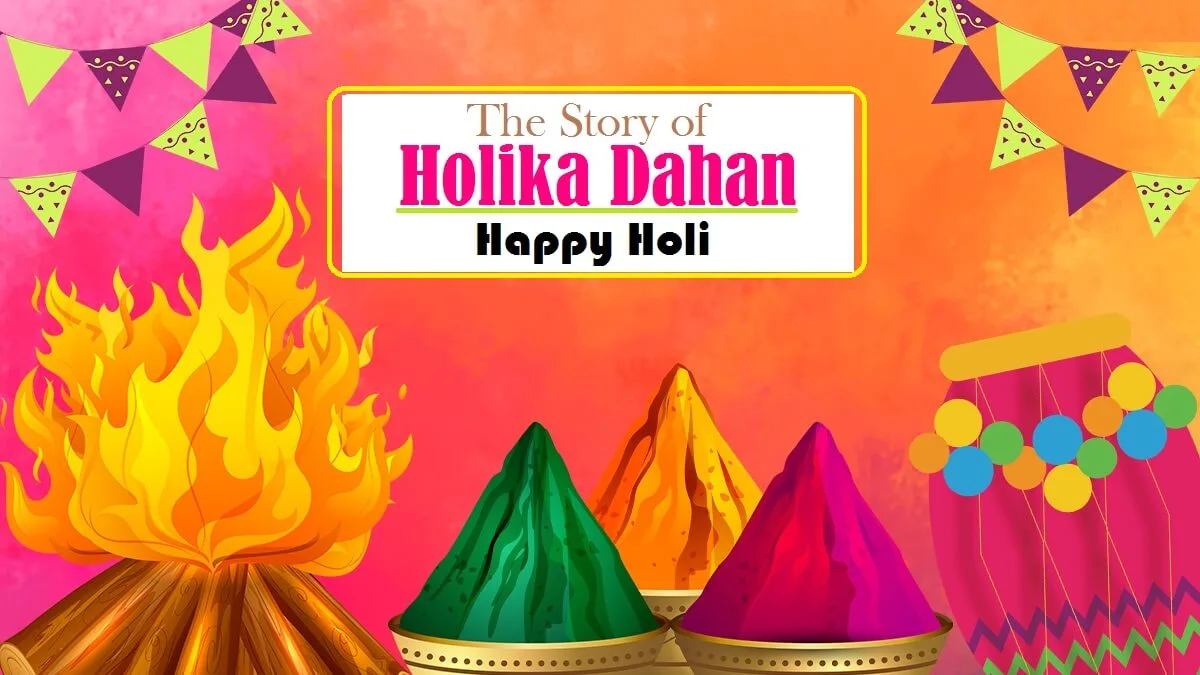The Story of Holika Dahan, Time & Significance
Continue reading "The Story of Holika Dahan, Time & Significance"

Discovering the Wonders of Holika Dahan: A Hindu Celebration of Protection and Renewal.
What is the story behind Holika Dahan?
Holika Dahan, also known as Chhoti Holi or Little Holi, is a Hindu festival celebrated annually on the eve of the festival of colors, Holi. It symbolizes the victory of good over evil and is an important celebration in Hinduism.
The story behind Holika Dahan dates back to ancient Hindu mythology. According to the legend, there was a king named Hiranyakashyap who considered himself God and ordered everyone to worship him. But his own son, Prahlad, refused to do so and instead worshiped Lord Vishnu. Enraged, the king asked his sister, Holika, to take Prahlad into a fire with her, as she was immune to being burned. However, as Holika sat in the fire with Prahlad, the power of Lord Vishnu’s devotion protected Prahlad, and Holika was burned to ashes.
Holika Dahan is observed to commemorate this event and symbolizes the triumph of good over evil. On this day, bonfires are lit in public spaces and people gather around them to perform prayers and rituals. Fire is considered sacred and is believed to purify the surroundings and protect them from evil. People throw dry leaves, twigs, and waste materials into the fire as a symbol of burning their negative thoughts and actions.
The festival of Holika Dahan is also a time for families and friends to come together and celebrate the arrival of spring. People sing, dance, and feast to mark the occasion. The next day, Holi is celebrated with the festival of colors, where people play with colored powder and water, dance, sing, and feast.
What is Holika Dahan time 2023?
Holika Dahan is celebrated on the night before the Hindu festival of Holi, usually in February or March, depending on the Hindu lunar calendar. The exact date of Holika Dahan changes every year, but it usually falls in the period of late February to early March. On the day of Holika Dahan, bonfires are lit in the evening, and people gather around them to perform prayers and rituals. The festival is a time for families and friends to come together, celebrate the victory of good over evil, and welcome spring with joy and happiness.
Holika Dahan is a Hindu festival that marks the victory of good over evil. It is celebrated on the full moon day in the Hindu month of Phalguna, which usually falls in late February or early March. In 2023, Holika Dahan is on 07 March.
The exact time of Holika Dahan may vary depending on the location and local traditions. However, the generally accepted timing for the ritual is after sunset, during the Pradosh Kaal. In 2023, the Pradosh Kaal timing is from 6:23 PM to 9:02 PM (local time). Therefore, Holika Dahan is expected to take place during this period. However, it is recommended to check with local authorities or religious leaders for the exact timing in your location.
Don’t Miss to Read: Reasons: Why Newly Wedded Brides Celebrate Their First Holi After Marriage at Their Parental Home
How is Holika Dahan done?
Holika Dahan is performed as a religious ceremony in Hinduism to commemorate the victory of good over evil.
Here is the way On the night of Holika Dahan, families, and communities gather together to light a bonfire in a public space. The bonfire is considered sacred and is seen as a symbol of purification and protection from evil.
People perform prayers and rituals around the bonfire, offering food and other offerings to the fire as a symbol of burning their negative thoughts and actions. They sing hymns, chant mantras, and throw dry leaves, twigs, and waste materials into the fire.
After the prayers and rituals are over, people usually feast and sing songs together, celebrating the arrival of spring. The next day, Holi is celebrated with the festival of colors, where people play with colored powder and water, dance, sing, and feast.
In conclusion, Holika Dahan is a religious ceremony that is performed with great devotion and joy, marking the triumph of good over evil and the arrival of spring.
What is the significance of Holika Dahan?
Holika Dahan is a Hindu festival that holds great cultural and religious significance. The festival commemorates the victory of good over evil and is celebrated on the night before the Hindu festival of Holi. The main significance of Holika Dahan can be summarized as follows:
1. The victory of Good over Evil: The legend behind Holika Dahan symbolizes the triumph of good over evil, as Lord Vishnu’s devotion protected Prahlad and Holika was burned to ashes. The festival reminds people of the importance of good values and the defeat of evil.
2. Purification and Protection: The bonfire lit on Holika Dahan is considered sacred and is believed to purify the surroundings and protect them from evil. People throw dry leaves, twigs, and waste materials into the fire as a symbol of burning their negative thoughts and actions.
3. The arrival of Spring: Holika Dahan marks the arrival of spring, a time of new beginnings, growth, and happiness. The festival is a time for families and friends to come together and celebrate the season with joy and happiness.
4. Cultural Significance: Holika Dahan is an important cultural celebration in Hinduism and is celebrated with great devotion and enthusiasm in India and other Hindu communities around the world. The festival is a time for people to come together and celebrate their traditions and customs.
DON’T MISS TO READ: The Most Popular Places to Celebrate Holi in India
In conclusion, Holika Dahan is a significant Hindu festival that holds great cultural and religious importance. It is a time to celebrate the victory of good over evil, purify and protect oneself, welcome spring, and come together with loved ones to celebrate cultural traditions.






